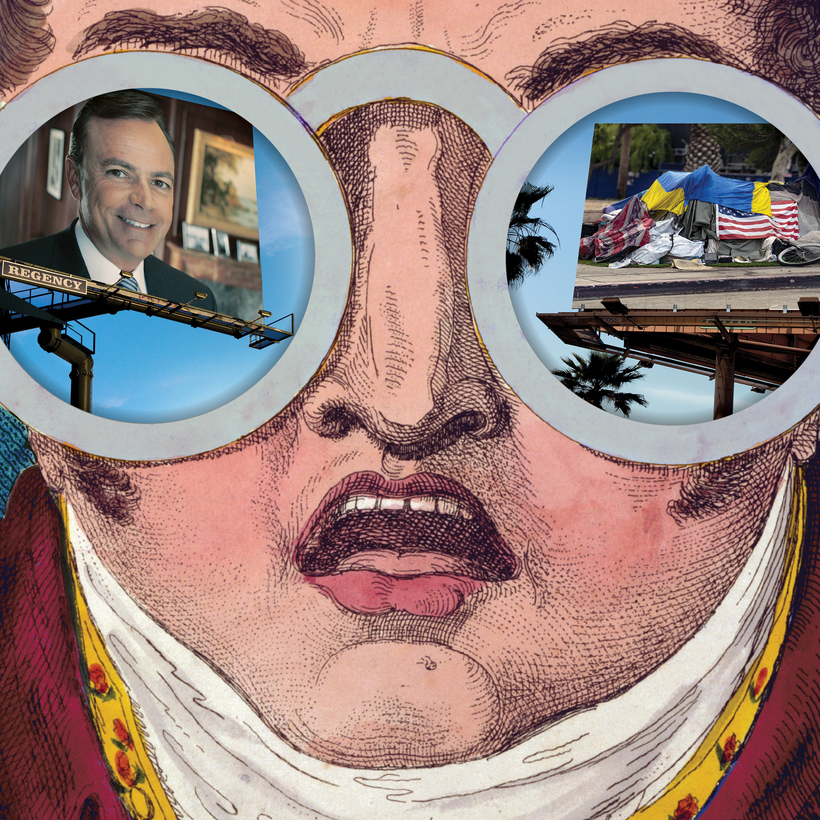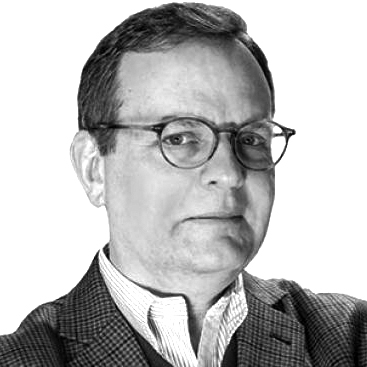The population of Los Angeles is nearly half Latino, its electorate is barely 15 percent Republican, and its ruling Democratic establishment is as woke as any liberal insomniac in the land.
So why is the man to beat in this year’s mayoral election suddenly Rick Caruso, a 63-year-old white billionaire, a former Republican whose 215-foot yacht, Invictus, rents for $550,000 a week, and whose luxury hotel outside Santa Barbara offered a festive Fourth of July brunch last summer for $250—per person?
The short answer: privileged residents of the City of Angels are fed up with the earthly problems that increasingly darken its sun-splashed streets—crime, poverty, and rampant homelessness that have left its incumbent mayor, Eric Garcetti, who’s leaving office early to be Joe Biden’s ambassador to India, all too prepared for his next gig.
Liberal fatigue is not unique to Los Angeles. Eric Adams, a former police captain, won the New York mayoralty last year on a business-friendly, “blue-collar” platform that emphasized public safety.
But a recent spate of high-profile violent crimes—notably the home-invasion murder of philanthropist Jacqueline Avant, the mother-in-law of Netflix co-C.E.O. Ted Sarandos (with a private security guard present in her Beverly Hills house!)—has upended L.A.’s usual liberal lean. After Caruso announced his candidacy last week, Sarandos promptly endorsed him as “a decent man who loves our city and has a successful history of doing hard things that make it a great place to live and work.” Support from Sarandos, whose wife, Nicole Avant, was Barack Obama’s ambassador to the Bahamas, amounts to a hall pass that could give fellow Hollywood liberals permission to do likewise.
A recent survey by the Committee for Greater L.A., a coalition of civic groups, found widespread distress at the status quo. “The degradation of life in L.A. is exponential, and I don’t see an end,” one white-male voter told a focus group in the survey. “The politicians are dufuses.”
A recent spate of high-profile violent crimes—notably the home-invasion murder of philanthropist Jacqueline Avant (with a private security guard present in her Beverly Hills house!) has upended L.A.’s usual liberal lean.
In more typical times, Karen Bass, the six-term liberal Black congresswoman who represents a district south and west of downtown, might be a prohibitive front-runner in an already crowded field of local pols, with a $2 million war chest and a national profile that put her on Biden’s short list as a potential 2020 running mate. But blatant public dysfunction (one former city-council member was recently convicted of corruption and two others are under indictment), plus Caruso’s unlimited capacity to finance his own campaign, makes him a strong contender to be one of the top-two finishers in the June primary, who will advance to the November election. (In L.A., candidates’ partisan affiliations do not appear on the ballot.)
Caruso’s father started the family fortune as the founder of Dollar Rent a Car, but he has built a far larger empire as a developer of high-end shopping malls, such as the Grove, the luxury enclave in central Los Angeles whose close to 20 million annual visitors in pre-pandemic times made it a more popular destination than Disneyland and the Great Wall of China.
“No one believes that the same group of politicians who allowed our city to become this unsafe, corrupt and cruel can solve any of the problems we face,” Caruso said last month as he changed his party registration from no preference to Democratic.
Raphael Sonenshein, executive director of the Pat Brown Institute for Public Affairs at California State University, Los Angeles, says it would be folly to discount Caruso’s potential appeal. “What it’ll really come down to is not is he a rich guy with a yacht?” he said. “What matters is, as an outsider, is he someone who can solve problems the insiders haven’t been able to solve? I will tell you voters are going to be shopping more carefully than they have in other elections.”
Caruso is rich but not easy to caricature, with a long record of civic engagement and philanthropy. Tom Bradley, the city’s long-serving Black mayor, made him the youngest city commissioner in history when Caruso was not yet 30, appointing him to the board of the powerful municipal utility the Department of Water and Power, and as president of the civilian police commission two decades ago Caruso was instrumental in hiring the reform-minded chief Bill Bratton. He has donated more than $100 million to local charities and supported Democratic and Republican candidates and causes alike. Think of him as a kind of Catholic Mike Bloomberg, propertied but public-spirited.
“No one believes that the same group of politicians who allowed our city to become this unsafe, corrupt and cruel can solve any of the problems we face.”
Nearly 30 years ago, another rich Republican businessman, Richard Riordan, won the L.A. mayoralty in the wake of the 1992 riots, but the city was then much less diverse, Republicans accounted for about a third of registered voters, and homeowners greatly outnumbered the renters, who are increasingly prevalent in a city where housing prices are sky high. The issue now is whether dystopian civic conditions can once again propel an outsider to office.
In recent years, city and county voters have approved more than a billion dollars in bond issues and tax increases to build permanent housing, and tens of thousands of people have, in fact, been moved off the streets. But the problem persists—tent encampments in the shadow of City Hall’s Dragnet ziggurat have spawned outbreaks of flea-borne typhus—and California’s salubrious climate means that homelessness is a visible crisis 365 days a year.
“It’s not just crime,” says the longtime Democratic consultant Bill Carrick. “The liberal-progressive community is ripping itself apart over the homelessness issue. People are angry and pissed off. You add in the economy and Covid and you’ve got a pretty mean stew.”
Think of him as a kind of Catholic Mike Bloomberg, propertied but public-spirited.
Caruso has flirted with a mayoral run for years, but signaled his seriousness by hiring a team of top-flight operatives, including Mark Fabiani, a former Bill Clinton aide whose local expertise goes back to Bradley’s days in City Hall.
In 1993, Riordan’s winning slogan was “Tough enough to turn L.A. around,” and Sonenshein notes that the operative word was “enough,” because it didn’t frighten liberals. The question, in the crisscrossing currents of these times, is whether Caruso’s outsider pedigree will again strike voters as just about right, or too much.
Todd S. Purdum is the author of several books, most recently Something Wonderful: Rodgers and Hammerstein’s Broadway Revolution


